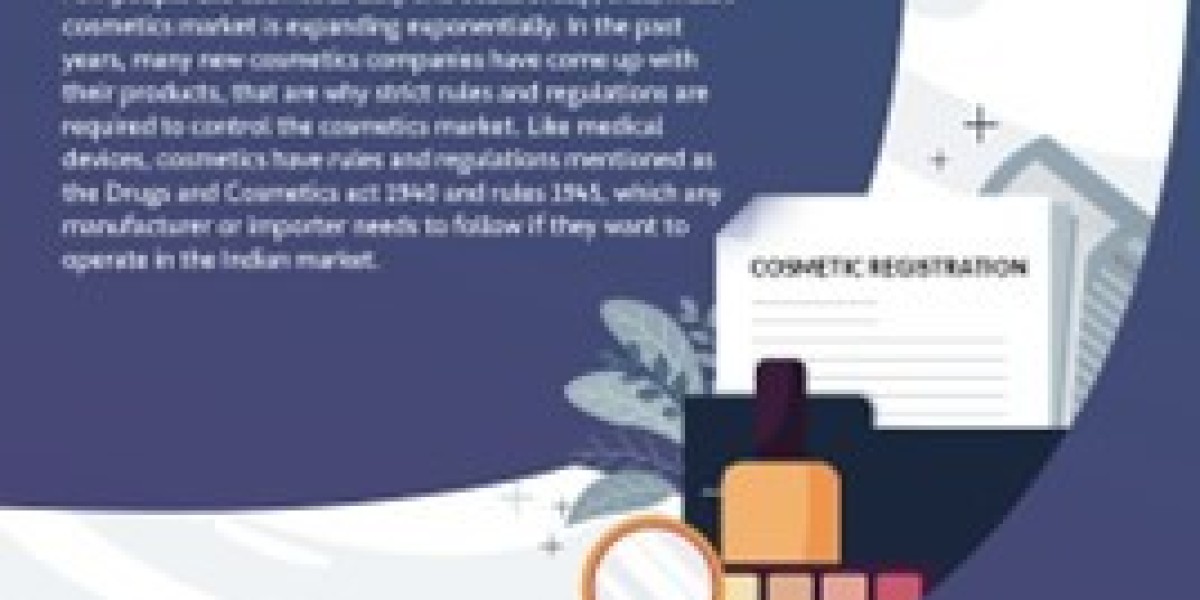Few people use cosmetics daily and occasionally; thus, India's cosmetics market is expanding exponentially. In the past years, many new cosmetics companies have come up with their products that is why strict rules and regulations are required to control the cosmetics market. Like medical devices, cosmetics have rules and regulations mentioned as the Drugs and Cosmetics act 1940 and rules 1945, which any manufacturer or importer needs to follow if they want to operate in the Indian market. India's Central Drug Standard Control (CDSCO) licensing Authority regulates cosmetics registration in India. These acts and rules aim to determine the quality and safety of the cosmetics products being sold. Also, it ensures that cosmetics brands do not make false claims that will mislead consumers. These acts and rules mainly protect consumers from misleading products and ensure fair trade among cosmetics manufacturers and importers.
BLOG CONTENT:
According to the Drugs and Cosmetics Act 1940 and rules 1945 under section 3 (aaa), cosmetics are defined as the substances or preparations intended to be applied to the human body to that helps it to clean, enhance, endorse attractiveness, or modify appearance. It includes products such as face creams, body lotions, face or body powder, perfume, hair dyes, hair removers, nail polish, lipstick, deodorants, etc.
List of Cosmetic Products
- Deodorant soaps;
- Hair colorants;
- Hair setting products;
- Products of lips;
- Skin-whitening products;
- Face masks;
- Toilet soaps;
- Face Creams, body lotions, oil & gels for the skin;
- Make-up powders;
- Face masks;
- Deodorants and Antiperspirants;
- Waving, fixing hair, and straightening products for hair;
- Products of Mouth & teeth;
- Products for wrinkles;
- Bath and shower items including salts, foams, oils, and gels;
- Hairdressing products such as lacquers, lotions, and brilliantine;
- Products for make-up andmake-up removing products;
- Products for external and intimate hygiene;
- Sunbathing products;
- Depilatories;
- Hygienic powders;
- After-bath products;
- Tinted bases (pastes, liquids, powders);
- Shaving products (lotions, creams, foams);
- Toilet waters, perfumes and Cologne;
- Make-up powders.
- Categories of Cosmetics
Schedule M II is omitted from the guidelines. Please consider the Fourth Schedule[See rule 12 (6)List of categories of cosmetics for import
The forms required for cosmetics registration in India are:
FORM | DESCRIPTION | FEES |
FORM COS-1 | Application for issuing import registration certificate. | 1000 USD is charged per category, 50 USD per variant, and 500 USD per manufacturing site. |
FORM COS-2 | Import registration certificate to import cosmetics | The Import License is granted in this form. |
FORM COS-3 | Grant of Permission to manufacture or import new cosmetics in India. | $500 |
FORM COS-5 | Grant application for a license to manufacture cosmetics for sale or for distribution. |
INR 10000 (Up to 10 items of each category) and INR 500 for each additional item. |
FORM COS-8 | License to manufacture new cosmetics in India. | |
FORM COS-12 | Grant of permission for new cosmetics to obtain import registration certificate or manufacturing license. | $500 |
List of Documents Required for Grant for import registration certificate for Cosmetics into India
- Cover Letter
- Authorization from the manufacturer (duly authenticated)
- Filled inSecond Schedule Part-I
- List of Ingredients and their content percentage.
- Labels of planned products
- Methods of testing and specification
- Pack inserts
- Manufacturing Licenses/committing to not granting any manufacturing licences within the nation.
- Free Sale Certificate (duly authenticated)
- Declaration of Non-animal testing
- Heavy Metal and Hexachlorophene content declaration
- Other documents (If any).
- E-receipt for the fee paid
Documents Required for Cosmetic Manufacturing License
- Power of Attorney in favour of authorized agent eligible for submitting Application on behalf of the company;
- List of Directors, Partners, and Trustees
- Copy of registration of companies (ROC), registered Partnership Deed, Trust Deed;
- Cover Letter
- Appointment Letter of Competent Technical staff of the manufacturing section (Not mandatory)
- Plant and machinery (section-wise list)
- The process of a flow chart along with details of the manufacturing process
- Site Master File;
- Constitution details of firms;
- List of SOPs;
- Challan of fees paid;
- Copy of draft label;
- Site Plan and layout of the building with the name, address, and measurements of the area;
- Self-attested copies of documents of the possession of premises e Rent or Register Ownership or Lease or Possession Letter (applicant should register documents with appropriate Authority);
- A list of technical staff who are qualified, experienced, registered, and have had prior FDA approvals, etc.
STEPS TO REGISTER COSMETICS IN INDIA:
STEP 1: Fill out the application form as per the import or manufacturing requirement
STEP 2: Appoint the authorized agent (if needed)
STEP 3: Submit the documents as per the category, i.e., to manufacture or import
STEP 4: Scrutiny of documents: Licensing Authority examines the Application.
STEP 5: Grant of license: When licensing Authority finds satisfactory documents, permission is granted.
To submit the forms and get the license, applicants are advised to consult a regulatory representative who can help them get the license without delay.
Conclusion: The regulatory body of India has full Authority to cancel or reject the Application in case the documents are not completed or correct. The main objective of CDSCO is to ensure that whatever cosmetic product people use does not harm the population or mislead them with false promises. That's why not only registration but CDSCO pays attention to the labels and even advertisements. In case of non-compliance with the regulations, the CDSCO can cancel or revoke the license at anytime; they give the applicant enough time to justify their point. But applicants must discontinue selling their products when they fail to provide a satisfactory justification. Thus, applicants should ensure that the documents submitted are correct, and they shall have the justification in case of any incomplete document. Not only documents but even during the audits also, the applicant need to understand the gaps so that they don't face any issues in the future.



